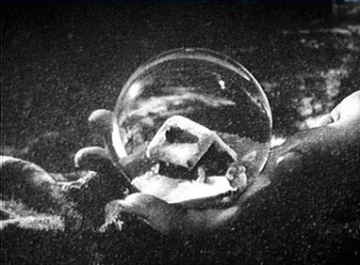Has anyone seen Dom DeLuise lately? I’m beginning to worry.
It’s no trick to piss off the level-headed, if all you want is to piss off the level-headed.
 Despite DVR-ing it, I didn’t actually watch the American Film Institute’s uncalled for update of its 100 Years, 100 Movies list, which blocked out all three hours of CBS’s prime time programming Wednesday night (though I did scan the ads because some asshole intimated there’d be a Dark Knight teaser sandwiched into one of the commercial breaks). I ignored it for a variety of reasons, but mostly because the original list included a) no Lubitsch, b) not enough Hawks and c) too much Wilder; look, I can handle To Be or Not to Be getting bumped, but excluding The Shop Around the Corner is an act of profound idiocy. Why bother if you hate movies that much?
Despite DVR-ing it, I didn’t actually watch the American Film Institute’s uncalled for update of its 100 Years, 100 Movies list, which blocked out all three hours of CBS’s prime time programming Wednesday night (though I did scan the ads because some asshole intimated there’d be a Dark Knight teaser sandwiched into one of the commercial breaks). I ignored it for a variety of reasons, but mostly because the original list included a) no Lubitsch, b) not enough Hawks and c) too much Wilder; look, I can handle To Be or Not to Be getting bumped, but excluding The Shop Around the Corner is an act of profound idiocy. Why bother if you hate movies that much?
Still, I wasn’t surprised to wake up Thursday morning to find that a few bloggers and columnists had taken the bait and sounded off on the re-jiggered 100 (beats filing another story on the Sicko leak). "What happened to Fargo?" "Why jettison A Place in the Sun?" "Who are the pricks that keep voting for Forrest Gump?" All legitimate questions. But this time out, there was a troubling sentiment bubbling up; apparently, Citizen Kane has gone from inarguable top dog to tiresome, possibly undeserving model of cinematic greatness.
First, there’s The Chicago Tribune‘s Marc Caro (who should seriously consider redesigning his column’s wincingly dorky logo):
"Citizen Kane is No. 1 again. Ho hum."
How about "Citizen Kane is No. 1 again. Good."? At least Caro didn’t challenge Kane‘s claim to the top spot. But if you’re looking for a fella to hold down an untenable position, Jeffrey Wells of Hollywood Elsewhere is forever your man:
"That said, there’s something strangely stubborn, even bizarre, about the members continuing to put Orson Welles’ Citizen Kane in the #1 position. I’m saying this because of a general understanding that kicked in around eight or ten years ago that the industry’s long-established Kane worship was winding down and that Francis Coppola’s The Godfather was emerging as the new All-Time Big Daddy."
Exactly what "general understanding" is Wells talking about? And who specifically is towing that line (other than himself)?
Forget The Godfather supplanting Kane as the exemplar of American moviemaking, doesn’t conventional wisdom still hold that The Godfather Part II is the greater achievement? And, if we’re talking about revisionist critical thought (i.e. amongst cineastes), isn’t it The Conversation that’s often cited as the best of Francis Ford Coppola’s brilliant 1970s output? Furthermore, if you did leave the voting to rank-and-file moviegoers (and it certainly feels like the AFI did precisely that), I’d imagine the "general understanding" would have Star Wars or Gone with the Wind edging out The Godfather as the GOAT (provided you didn’t limit your sample size to Bensonhurst residents – and even they might opt for Goodfellas).
All this aside, why the need to question Citizen Kane‘s well-deserved status? Orson Welles didn’t suffer enough, so now we have to deprive his most celebrated work of the sole platitude that keeps it lingering in the general public’s consciousness? I could perhaps understand this desire to unseat Kane if it were inaccessible or unentertaining, but it’s actually more geared to mainstream sensibilities now than it was sixty years ago; it’s energetic, expertly paced and verily stuffed with quotable dialogue. Citizen Kane is ageless. It’s the kind of movie offers something new with each viewing (be it the third or thirtieth). And it still has the power to transform a casual viewer of films into a raging cinema buff. Leave it to Roger Ebert, in his measured defense of the AFI list, to get it right:
"But such lists serve two functions: (1) The television special makes money for the American Film Institute, which is a noble and useful institution, and (2) some kid somewhere is gonna rent Citizen Kane and have the same kind of epiphany I had when I first saw it as a teenager."
I don’t think there’s one word to describe Citizen Kane‘s greatness, but there is a number: one. Let’s keep it that way.
Oscar Campaigning in June
 David Poland’s compiled his long shortlist. Jeffrey Wells has helpfully categorized the purebreds for his own benefit. And publicists are beginning to position potential underdogs in lieu of a Little Miss Sunshine looming on the boutique horizon. The month-early Oscar ceremony is still relatively new to all of us, but I think this is the way it’s going to be from here to inanity. June is the new September (which was the old November).
David Poland’s compiled his long shortlist. Jeffrey Wells has helpfully categorized the purebreds for his own benefit. And publicists are beginning to position potential underdogs in lieu of a Little Miss Sunshine looming on the boutique horizon. The month-early Oscar ceremony is still relatively new to all of us, but I think this is the way it’s going to be from here to inanity. June is the new September (which was the old November).
For example: yesterday, there was a long-lead screening for a prestige heavyweight from one of the major studios. I didn’t go, but Jeffy Wells did, and, after trying to be coy about what he’d seen (and flipped for) on his blog, AICN‘s MiraJeff (aka Jeffrey Sneider) barged in and boldly outed the movie as Paul Haggis’s In the Valley of Elah in the corresponding comments section*. Next thing you know, the invaluable Sasha Stone of Awards Daily (formerly Oscarwatch) is running with the story and seriously considering Elah‘s awards prospects – which are more complicated than you might think given Haggis’s recent Best Picture win – for her numerous readers (many of whom are Academy voters). Is this an embargo breach? You best believe it is, Chauncey. But if you think this is all unintentional on Warner Brothers’ part, you haven’t been paying attention. In the Valley of Elah has a perception problem: voters who hated Crash are predisposed to loathe everything Haggis touches (as a director) for the next several years, while voters who supported Crash are probably reticent to get behind Haggis so soon after his controversial win (that said, they might be willing to Grand Prix him with Best Director). Though a Toronto Film Festival berth seems inevitable, the critics are primed to kill Haggis’s next regardless of Elah‘s quality; they can’t wait to bury this fucker. The only way to get this film a fair shake in Toronto (or at least ahead of its September 21st release date) is to generate some positive buzz via a loudmouth, articulate, grudgingly respected blogger who lives to be first in line to marvel at the emperor’s clothes. (What’s amusing this time is that Wells may have actually made it a day or two without spilling the beans. Damn that MiraJeff!)
Two-and-a-half months out of Toronto, and guess what In the Valley of Elah no longer has: a perception problem. Well played.
Because I’m scared shitless of being likewise outed on the CHUD boards, I’m going to refrain from tipping my hand one way or the other regarding the perceived contender I saw today (hint: it was Things We Lost in the Fire). What I will say, however, is that, sitting in that screening room, the energy had nothing to do with wanting to like the movie and everything to do with gauging its awards prospects. "Is it too sad?" "Is it funny enough?" "Was the script overhyped?" "Is Benicio back in Traffic form?" "Can we forgive Halle for everything between this and Monster’s Ball?" "Is that MiraJeff from AICN!?!?"
Back to Coppola, can you imagine if The Godfather Part II had been subjected to such scrutiny so many months ahead of the Oscars (and by so many critics/tastemakers who don’t know how to watch a movie in the first place)? The awards season already had little to do with actual quality; now, it’s about ninety-percent political. What’s alarming is that the so-called prestige pictures are getting more and more preprogrammed to the point that, from the page to the screen, it’s hard to tell what’s genuine.
Dead on the Farm
The Sausage King of Gallipolis, Ohio is no more. Bob Evans passed away this Thursday at the age of eighty-nine. Whenever someone asks me what I miss most about living in the midwest, I frequently say, "Bob Evans". What I wouldn’t give to scarf down a "Homestead" breakfast in the restaurateur’s honor right now.
*MiraJeff also bragged that he’d had the same tearful reaction to Crash as Al Sharpton, which may be the most damning criticism yet penned in reference to the 2006 Best Picture winner.